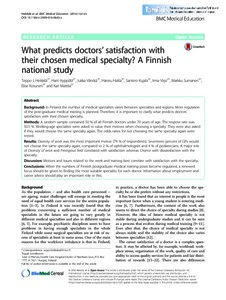What predicts doctors’ satisfaction with their chosen medical specialty? A Finnish national study
Heikkilä, Teppo J; Hyppölä, Harri; Vänskä, Jukka; Halila, Hannu; Kujala, Santero; Virjo, Irma; Sumanen, Markku; Kosunen, Elise; Mattila, Kari (2016)
Heikkilä, Teppo J
Hyppölä, Harri
Vänskä, Jukka
Halila, Hannu
Kujala, Santero
Virjo, Irma
Sumanen, Markku
Kosunen, Elise
Mattila, Kari
2016
BMC Medical Ecucation 16
125
Lääketieteen yksikkö - School of Medicine
This publication is copyrighted. You may download, display and print it for Your own personal use. Commercial use is prohibited.
Julkaisun pysyvä osoite on
https://urn.fi/URN:NBN:fi:uta-201604281494
https://urn.fi/URN:NBN:fi:uta-201604281494
Kuvaus
BioMed Central open access
Tiivistelmä
Background
In Finland the number of medical specialists varies between specialties and regions. More regulation of the post-graduate medical training is planned. Therefore, it is important to clarify what predicts doctors’ satisfaction with their chosen specialty.
Methods
A random sample contained 50 % of all Finnish doctors under 70 years of age. The respose rate was 50.5 %. Working-age specialists were asked to value their motives when choosing a specialty. They were also asked if they would choose the same specialty again. The odds ratios for not choosing the same specialty again were tested.
Results
Diversity of work was the most important motive (74 % of respondents). Seventeen percent of GPs would not choose the same specialty again, compared to 2 % of ophthalmologists and 4 % of pediatricians. A major role of Diversity of work and Prestigious field correlated with satisfaction whereas Chance with dissatisfaction with the specialty.
Discussion
Motives and issues related to the work and training best correlate with satisfaction with the specialty.
Conclusions
When the numbers of Finnish postgraduate medical training posts become regulated, a renewed focus should be given to finding the most suitable speciality for each doctor. Information about employment and career advice should play an important role in this.
In Finland the number of medical specialists varies between specialties and regions. More regulation of the post-graduate medical training is planned. Therefore, it is important to clarify what predicts doctors’ satisfaction with their chosen specialty.
Methods
A random sample contained 50 % of all Finnish doctors under 70 years of age. The respose rate was 50.5 %. Working-age specialists were asked to value their motives when choosing a specialty. They were also asked if they would choose the same specialty again. The odds ratios for not choosing the same specialty again were tested.
Results
Diversity of work was the most important motive (74 % of respondents). Seventeen percent of GPs would not choose the same specialty again, compared to 2 % of ophthalmologists and 4 % of pediatricians. A major role of Diversity of work and Prestigious field correlated with satisfaction whereas Chance with dissatisfaction with the specialty.
Discussion
Motives and issues related to the work and training best correlate with satisfaction with the specialty.
Conclusions
When the numbers of Finnish postgraduate medical training posts become regulated, a renewed focus should be given to finding the most suitable speciality for each doctor. Information about employment and career advice should play an important role in this.
Kokoelmat
- Artikkelit [6140]
